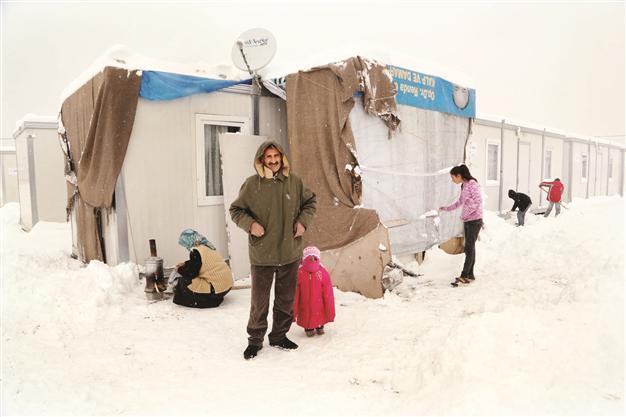Quake-hit families in Van continue to freeze in container homes
ISTANBUL - Hürriyet Daily News

Around 50 families living in containers during the harsh Van winter are refusing to leave their makeshift container homes unless they are provided with permanent residency. AA photo
Around 50 families living in containers during the harsh winter in the southeastern province of Van have refused to leave their makeshift container-homes, unless they are provided with permanent residency. Two years after two strong earthquakes hit the city, the same families are still trying to recover.Van Governor Aydın Nezih Doğan yesterday called on the quake-hit people to leave the container cities and move to regular apartment buildings, promising to cover the cost of the rent should they be unable to move.
However, the families demand more than merely a rent allowance, and fear that this allowance will be cut in the near future.
Ali Ahi, a local living in one of the containers, said they had no intention of leaving until they are given permanent residency and provided with a rent allowance.
“We want permanent houses. The rent prices are around 400 Turkish Liras but the allowance is 300 liras. The rent allowance might be cut after a year,” Ahi told the Hürriyet Daily News on Dec. 13.
Governor Doğan, however, said the rent allowance would not be cut until net family income for the families in question reached more than 243 liras per family member. Doğan also told the Daily News over the phone that they had taken into consideration the varied rent prices across Van’s low-income neighborhoods, which are between 125 and 300 liras. The rent allowance was thus determined to reflect the highest possible rent price in the subject area - as much as 300 liras.
Doğan also said the governor’s office would continue to support the families in question after they moved from the containers by providing them with basic needs, including coal and medical aid.
A majority of those affected by the quakes who used to reside in the containers have moved into regular housing over the past two years. Today, only around 50 families are still living in the containers, according to Ahi. Around 75 families recently agreed to receive the rent allowance and moved out of the containers, Governor Doğan said.
In a statement sent to the Daily News on Dec. 13, Doğan said demands for permanent housing - rather than just rent allowance - were "not acceptable" from those currently living in containers. “It is not acceptable to be of the opinion that those living in containers have a greater right [to public permanent housing],” read the statement.
Doğan added that approximately 1,000 families who were tenants during the quake would be awarded housing by means of a draw. A total of 24,569 families who were tenants during the quake had applied to own their homes and only 14,540 were eligible to participate in the draw, his statement said.
It also said that those currently living in containers would not be the only affected parties to be eligible for state-provided permanent housing, but those who had left the containers to rent homes as tenants would also be included in the scheme.
Ahi, however, said the families were determined to stay in the containers, despite the lack of electricity.
“An issue that needs to be urgently addressed is the lack of electricity across the container complex. We don’t have any access to heat to be able to bath or prepare meals as a result of having no electricity,” he said.
Electricity that was being supplied to the makeshift container housing complex was cut in August, in an effort to get the families to move out of the containers. The families reacted by taking it in turns to go on hunger strike since then, in an attempt to draw attention to the situation.
A 7.2 and a 5.6-magnitude earthquake devastated an area near Van on Oct. 23 and Nov. 9, 2011. Thirty-four container cities were set up after the tremors. Their gradual dismantlement occurred as the victims began to be moved to the 15,343 houses that were built as a result of the community project, headed by the state-owned Housing Development Administration of Turkey (TOKİ).
















